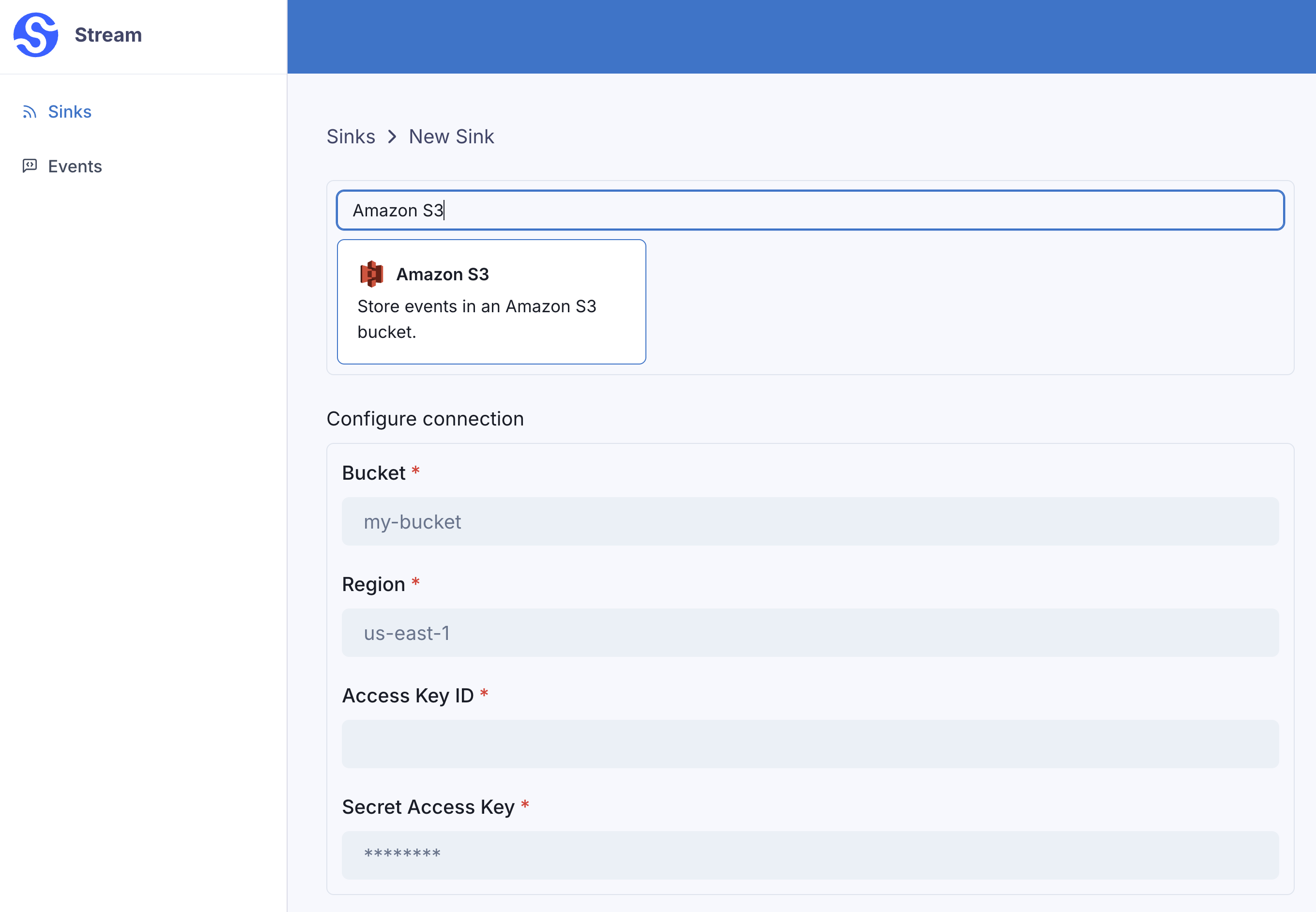Amazon S3
Events can be sent to an S3 bucket using the amazonS3 sink type.
Like all Sinks, S3 buckets can be created in the Stream Portal...

... or in the API.
curl -X 'POST' 'https://api.svix.com/api/v1/stream/strm_30XKA2tCdjHue2qLkTgc0/sink' \
-H 'Authorization: Bearer AUTH_TOKEN' \
-H 'Content-Type: application/json' \
-d '{
"type": "amazonS3",
"config": {
"bucket": "my-s3-bucket-name",
"region": "us-west-2",
"accessKeyId": "AKIA3LIKMTLDNWBX2PPD",
"secretAccessKey": "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"
},
"uid": "unique-identifier",
"status": "enabled",
"batchSize": 1000,
"maxWaitSecs": 300,
"eventTypes": [],
"metadata": {}
}'
Every event batch written to your S3 bucket will put a new object in the bucket.
Transformations
By default, all amazonS3 Sinks come bundled with the following transformation code.
/**
* @param input - The input object
* @param input.events - The array of events in the batch. The number of events in the batch is capped by the Sink's batch size.
* @param input.events[].payload - The message payload (string or JSON)
* @param input.events[].eventType - The message event type (string)
*
* @returns Object describing what will be put to the bucket.
* @returns returns.config
* @returns returns.config.format - The format of the request object put to the bucket. Valid values are "jsonl", "json", or "raw" (Defaults to jsonl).
* @returns returns.config.key - The name of the object that will be put to the bucket. This will be suffixed with a timestamp to avoid duplicate object names.
* @returns returns.data - The array of events to send to the bucket. This will be formatted according to the format.
*/
function handler(input) {
return {
config: {
format: "jsonl",
key: "object-generated-by-svix"
},
data: input.events
}
}
input.events matches the events sent in create_events.
config describes the object put in the sink - the key name of the object, and the format of the object saved to the bucket.
By default, the actual object key is always suffixed with a timestamp after the transformations are run. This ensures each event batch is saved as a unique object in the bucket.
For example, if the following events are written to the stream:
curl -X 'POST' \
'https://api.svix.com/api/v1/stream/{stream_id}/events' \
-H 'Authorization: Bearer AUTH_TOKEN' \
-H 'Accept: application/json' \
-H 'Content-Type: application/json' \
-d '{
"events": [
{
"eventType": "user.created",
"payload": "{\"email\": \"joe@enterprise.io\"}"
},
{
"eventType": "user.login",
"payload": "{\"id\": 12, \"timestamp\": \"2025-07-21T14:23:17.861Z\"}"
}
]
}'
The default transformation code would result in the following object being uploaded to your bucket.

And the files contents would match the jsonl format.
{"payload":{"email":"joe@enterprise.io"},"eventType":"user.created"}
{"payload":{"id":12,"timestamp":"2025-07-21T14:23:17.861Z"},"eventType":"user.login"}
If you want to control the format of the object more precisely, you can use config.format = "raw", and set data to a string of the exact file contents you want.